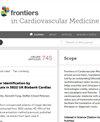Comparison of glucagon-like peptide-1 receptor agonists vs. placebo on any cardiovascular events in overweight or obese non-diabetic patients: a systematic review and meta-analysis
IF 2.8
3区 医学
Q2 CARDIAC & CARDIOVASCULAR SYSTEMS
引用次数: 0
Abstract
IntroductionGlucagon-like peptide 1 receptor agonists (GLP-1 RA) have been extensively used to treat obesity in recent years. These novel drugs are effective at reducing body weight and also the risk of major adverse cardiovascular events in individuals with type 2 diabetes. However, the data of its efficacy in reducing cardiovascular events in individuals without type 2 diabetes is not as robust. We aim to update and conduct a systematic review and meta-analysis to assess the same.MethodsThe study was conducted according to the PRISMA (Preferred Reporting Items for Systematic Reviews and Meta-Analysis) guideline. Researchers searched PubMed, EMBASE, and胰高血糖素样肽-1 受体激动剂与安慰剂对超重或肥胖非糖尿病患者心血管事件的影响比较:系统综述与荟萃分析
导言近年来,胰高血糖素样肽 1 受体激动剂(GLP-1 RA)被广泛用于治疗肥胖症。这些新型药物能有效减轻体重,同时降低 2 型糖尿病患者发生主要不良心血管事件的风险。然而,有关其在减少非 2 型糖尿病患者心血管事件方面疗效的数据却不那么可靠。我们旨在更新并开展一项系统综述和荟萃分析,以评估同样的效果。方法本研究根据 PRISMA(系统综述和荟萃分析首选报告项目)指南进行。研究人员检索了 PubMed、EMBASE 和 Clinicaltrails.gov 中从开始到 2024 年的英文文献。研究人员纳入了纳入超重或肥胖(体重指数> 25 Kg/m2)成年参与者(年龄≥18岁)的随机对照试验,并比较了服用GLP1-RA和安慰剂患者的所有心血管事件。分析由 Revman 5.4 版完成。结果 共有 17 项研究的 34,419 名参与者参与了分析。17项研究的风险比汇总结果表明,与服用安慰剂的患者相比,服用GLP-1 RA的患者发生心血管事件的风险显著降低(RR = 0.75;95% 置信区间为0.64-0.89,P值 = 0.0008)。结论这项荟萃分析发现,GLP-1 RA能显著减少无糖尿病的超重和肥胖患者的各类心血管事件。在减少心血管事件方面,塞马鲁肽优于其他药物。但仍需要正在进行的试验结果。系统综述注册https://www.crd.york.ac.uk/prospero/display_record.php?RecordID=553048,PROSPERO(CRD42024553048)。
本文章由计算机程序翻译,如有差异,请以英文原文为准。
求助全文
约1分钟内获得全文
求助全文
来源期刊

Frontiers in Cardiovascular Medicine
Medicine-Cardiology and Cardiovascular Medicine
CiteScore
3.80
自引率
11.10%
发文量
3529
审稿时长
14 weeks
期刊介绍:
Frontiers? Which frontiers? Where exactly are the frontiers of cardiovascular medicine? And who should be defining these frontiers?
At Frontiers in Cardiovascular Medicine we believe it is worth being curious to foresee and explore beyond the current frontiers. In other words, we would like, through the articles published by our community journal Frontiers in Cardiovascular Medicine, to anticipate the future of cardiovascular medicine, and thus better prevent cardiovascular disorders and improve therapeutic options and outcomes of our patients.
 求助内容:
求助内容: 应助结果提醒方式:
应助结果提醒方式:


